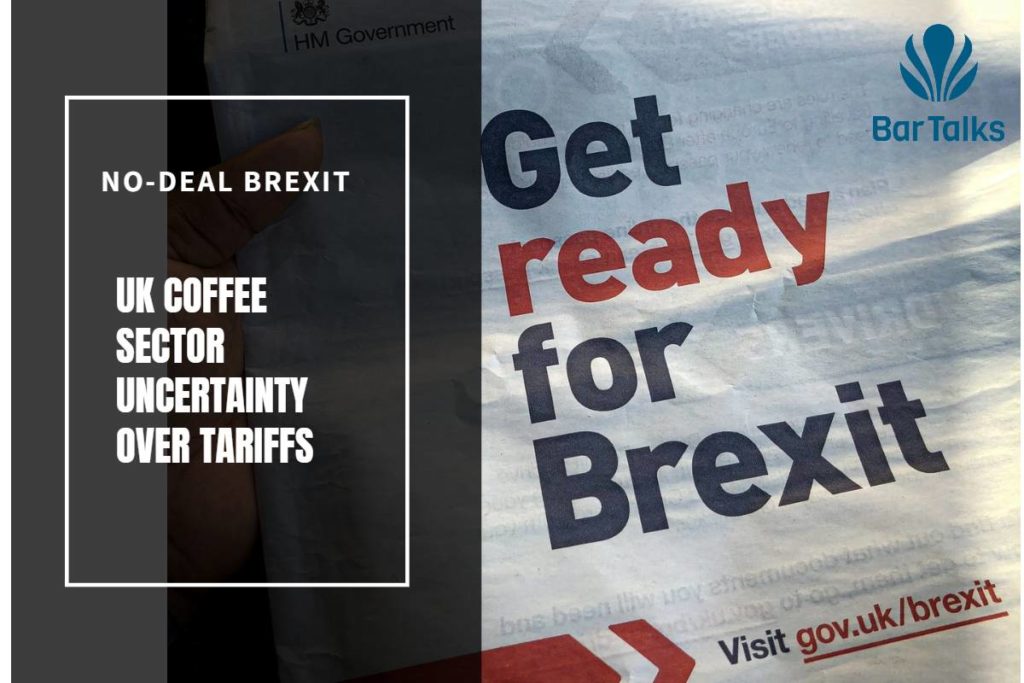As UK coffee shops and importers are hoping to recover from the global Covid pandemic, there are more challenges they have to face with a no-deal Brexit.
According to the British Coffee Association (BCA), the value of the UK coffee market is expected to fall 37.5% this year, and won’t get back to pre-pandemic levels until 2025.
It is uncertain whether new tariffs will add to UK coffee shops and importers costs, but with a no-deal Brexit, the cost of importing roasted coffee beans to the UK is expected to increase.
The pandemic has been good for London-based subscription company, Pact Coffee, which partly relies on customers staying home to brew their own coffee which suits the current change in consumption patterns due to lockdown restrictions.
Paul Turton, Chief Executive of Pact said, subscribers hit 60,000 this month, up from just 40,000 in March. It had taken years to hit 40,000.
The growth is great news, but now the uncertainty of Brexit looms on the horizon.
As the UK prepares to leave the European Union at the end of the year, with or without a new trade deal in place, Pact has doubled its usual stockpile of coffee beans to around six-months worth of supplies.
Turton said,
Essentially, because our revenue was up 50% this year, we’ve had to accelerate our importing of coffee. And the biggest concern around Brexit is going to be the disruption of the ports. The big unknown at the moment. That’s the big fear we have at the moment, because we can’t control that.
Without a deal, tariffs would start at 7.5% for roasted beans and 9% for instant coffee, in line with the World Trade Organization rules that would be put in place as the default, according to the BCA.
Any extra tariffs could have a big effect on shops that bring already-roasted beans into the UK, especially as retail sales dry up due to Covid lockdown restrictions.
At Climpson & Sons, an East London coffee importer and roaster, they have been receiving reassuring messages from the UK government and private couriers with basically the same message: after Brexit, all will be fine.
Danny Davies, Commercial Director at Climpson, which also runs a coffee shop said,
All the courier companies have been in touch recently about it. They’ve been preparing for a no-deal situation, so we’re all geared up, and ready to go.
New tariffs won’t be a problem for bigger importers like Climpson, which brings in about 200 tons or so of unroasted green beans each year from Brazil and Ethiopia.
About 190,000 tons of fresh beans were imported to the UK in 2019. This placed it among the world’s top importers, according to the BCA. Annual shipments have been growing by about 2.2% each year.
Paul Rooke, Executive Director of the British Coffee Association said,
As of now, those unroasted beans mostly aren’t subject to import duties, but in the event of a no-deal Brexit, where the UK would depart without new guidelines, there’s some uncertainty about their future.
There are still some countries which the UK has not achieved a continuity agreement with, which will mean tariffs where they do not exist at present.
Davies sounded less concerned: “It’s all speculation” until the country leaves the EU, he said.
But importers are worried about how a deal or no-deal Brexit will affect the physical movement of beans into the country. They could be delayed at bottle necked ports, even if they’re not coming directly from the EU.
One of the biggest concerns in the UK coffee industry is decaf, which is expected to get more expensive. It’s well-known that almost all of the decaf beans in all of Europe are from roasteries in Germany, said Rooke.
UK and EU negotiators have restarted talks over a post-Brexit trade deal in hope of securing an agreement.

